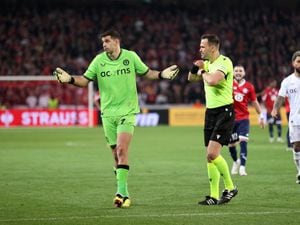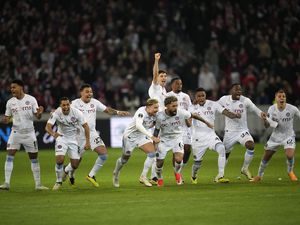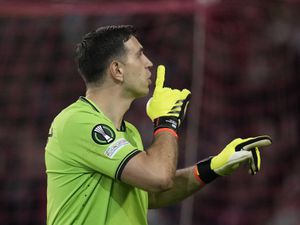Comment: A remarkable manager and man, Ron Saunders set the standard for everyone at Aston Villa to follow
Ron Saunders was Villa’s greatest ever manager and the standard against which all those to follow him have and will be judged.
In a reign lasting just under eight years, he took the club from the Second Division to the cusp of their finest hour.
Though he was not in the dugout for the 1982 European Cup final victory over Bayern Munich, having resigned just three months before, Saunders was very much the architect.
When supporters sing of that triumph, as they do at every match, they have him to thank.
One year prior to Rotterdam, Saunders had helped deliver the club’s first league title in 71 years.
Villa’s history, while already proud, would shine nowhere near so brightly without those two trophies.
To generations of supporters who had grown up on stories of the club’s pre-war success, Saunders delivered remarkable memories they could call their own, while his team created further legions of fans as Villa climbed to the summit of the European game.
He was in fact responsible for building three great teams in B6, the first of which claimed promotion and the League Cup during his first season after replacing Vic Crowe in the summer of 1974.
There are still fans, meanwhile, who claim the 1976/77 vintage of Andy Gray, Brian Little and Chris Nicholl was better than the one which won it all just a few years later.
They were certainly responsible for delivering some of the club’s most famous nights, including the 1977 League Cup final second replay victory over Everton at Old Trafford and the 5-1 battering of Liverpool earlier in the same campaign.
Commonly regarded as a disciplinarian who commanded respect, those who played for him insist Saunders’ hard and cold exterior belied a genuine warmth and an understanding of players which ensured he got the best out of them.
“A lot of people got the wrong idea about Ron Saunders, they all thought he was dull,” explains Tony Morley, a member of the club’s league and European Cup-winning team.
“But he had a fantastic, dry sense of humour. He was an old-fashioned manager, but he never really lost his temper in the dressing room.”
Saunders’ background as a centre-forward who had scored more than 200 goals in a playing career lasting 15 years came in particularly handy when it came to nurturing the talents of Gary Shaw.
Determined to keep the young striker’s feet firmly on the ground when fame and fortune beckoned, Saunders would constantly remind him that ‘the only stars are the one you see in the sky’.
If Shaw was performing poorly, Saunders would call him into his office and pretend to take phone calls from lower-league clubs interested in his services.
The motivation techniques worked and Shaw, whose goals were crucial to Villa’s league and European Cup success, came to regard Saunders as a ‘second father’.
“He was way ahead of his time,” says Morley. “Everything was done for the good of the team and everyone knew their jobs.
“He always wanted me and Gary to help out defensively, so he’d sit apprentices in the dugout counting the number of tackles each of us made.
“You might have a game where we would be 2-0 up. I might have made two and Gary might have scored two. But if we hadn’t made enough tackles, that is what we would hear about. He would not say anything about the positives, the skills we already had were taken as a read.
“He was always looking for ways to improve us as players and we respected him for that.”
Crucially, Saunders also understood the fans. Every week his programme notes would promise ‘110 per cent’ from the players, while his ‘Do you want to bet against us?’ riposte to reporters, at a time when Villa’s title challenge appeared to be faltering, is enshrined in immortality.
Unlike the victory over Liverpool, where the TV cameras were frustratingly not present, this exchange was caught on camera and offers a glimpse into Saunders the man,
At a time when to the outside world Villa appeared to be crumbling, he remained assured to the point of defiance.
It was a belief which permeated into his team. Just a few weeks later, they were champions.
There is, meanwhile, perhaps no greater example of Saunders’ standing as a man of principle than his departure from Villa Park over a contract dispute a few months down the line.
He was back a few weeks later, only this time in charge of Blues, where he would spend the next four years.
It was during his time at St Andrew’s Saunders set up the Save our Soccer (SOS) fund in aid of local charities, to which every player had to contribute, offering another window into his generous nature.
“He would often tell us we did not know how lucky we were to be footballers,” says Morley.
“Every so often he would take us on trips to hospitals to make us realise. A lot of people didn’t know it but he would quite often go out into the community and see those less fortunate. He made us realise how lucky we were.”
After Blues he joined Albion and though his spell at The Hawthorns was unsuccessful, he remains the only man to have taken charge of all three clubs. His standing as a giant of the Midlands game is beyond dispute.
For all Saunders’ achievements at Villa, we will never know how much more might have been possible had he stayed beyond February 1982.
The lack of any photos with the European Cup are, meanwhile, a factor in him not receiving the reverence reserved for Brian Clough and other contemporaries.
So too was Saunders’ reluctance to court the media and his willingness to walk away from the game entirely following his retirement.
“He is overlooked, definitely,” said Morley. “He left this club in his prime. Had they given him what he wanted, we could have gone on and dominated.
“Things were set up for the next five years and we were only just starting to see the fruits of his labour.
“I feel sorry for Villa supporters and I feel sorry for myself too. I would have liked another two or three trophies and we could have won them.
“When he left Villa I think he lost a bit of love for the game. He knew this was what he had worked for.
“We lost a chance, this club, to really take things to another level.”
Though Saunders might not get anywhere near the credit he deserves outside the Midlands, there is surely now no excuse for Villa not to recognise his achievements with a permanent tribute.
Though rival fans might tire of hearing about the early 80s, if anything the club has done nowhere near enough to celebrate the triumph, not least when it comes to recognising the man who did more than anyone else to deliver it.
Whether it be in the shape of a statue or the renaming of a stand, it is time for Villa to formally recognise the major part Ron Saunders played in shaping what the club is today.





